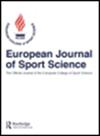Effects of mental fatigue on passing decision-making performance in professional soccer athletes
IF 3
3区 医学
Q2 SPORT SCIENCES
引用次数: 69
Abstract
Abstract The aim of this study was to analyse the effect of mental fatigue on passing decision-making in professional soccer athletes. A controlled and counterbalanced cross-over design was adopted consisting of three visits with a 1-week interval between sessions. Twenty professional soccer male athletes participated in three randomized conditions divided into three visits: control, 15-min Stroop task, and 30-min Stroop task. Inhibitory control was accessed by the Stroop task (accuracy and response time) before and after induced mental fatigue protocol. The athletes played a training match (90-min) following the experimental conditions. The Game Performance Assessment Instrument (GPAI) was used for the passing decision-making analysis. The GPAI analysis showed impaired passing decision-making performance following the 30-min Stroop task compared with the 15-min and control condition (F (2,17) = 6.99, p = .01). Moreover, an increase in response time during the Stroop task was found following 30-min Stroop task condition (F (2,17) = 6.57, p = .03) compared to 15-min of Stroop task and control conditions. Prolonged cognitive tasks may be considered a mediating factor in passing decision-making performance in male professional soccer athletes throughout a full-length training match. Thus, athletes should avoid highly demanding-cognitive tasks before a soccer match. Future studies are required to explore more ecological cognitive tasks to induce mental fatigue (i.e. smartphones and video-games) and their effects on other performance indicators (e.g. physical, technical, tactical) in a full-length training match setting.心理疲劳对职业足球运动员传球决策绩效的影响
摘要本研究旨在分析心理疲劳对职业足球运动员传球决策的影响。采用控制和平衡交叉设计,包括三次访问,每次访问间隔1周。20名男性职业足球运动员参加了三个随机条件,分为三次访问:对照组,15分钟Stroop任务和30分钟Stroop任务。在诱导精神疲劳方案前后通过Stroop任务(准确性和反应时间)获得抑制控制。在实验条件下,运动员进行了一场90分钟的训练比赛。采用博弈绩效评估工具(GPAI)进行传球决策分析。GPAI分析显示,与15分钟和对照组相比,30分钟Stroop任务后的传球决策能力下降(F (2,17) = 6.99, p = 0.01)。此外,与15分钟的Stroop任务和对照条件相比,30分钟Stroop任务条件下的反应时间增加(F (2,17) = 6.57, p = 0.03)。长时间的认知任务可能被认为是男性职业足球运动员在全程训练比赛中传球决策表现的中介因素。因此,运动员应该在足球比赛前避免高要求的认知任务。未来的研究需要探索更多的生态认知任务,以诱导精神疲劳(即智能手机和视频游戏)及其对其他性能指标的影响(如身体,技术,战术)在全长训练比赛设置。
本文章由计算机程序翻译,如有差异,请以英文原文为准。
求助全文
约1分钟内获得全文
求助全文
来源期刊
CiteScore
6.60
自引率
3.10%
发文量
153
审稿时长
6-12 weeks
期刊介绍:
The European Journal of Sport Science (EJSS) is the official Medline- and Thomson Reuters-listed journal of the European College of Sport Science. The editorial policy of the Journal pursues the multi-disciplinary aims of the College: to promote the highest standards of scientific study and scholarship in respect of the following fields: (a) Applied Sport Sciences; (b) Biomechanics and Motor Control; c) Physiology and Nutrition; (d) Psychology, Social Sciences and Humanities and (e) Sports and Exercise Medicine and Health.

 求助内容:
求助内容: 应助结果提醒方式:
应助结果提醒方式:


